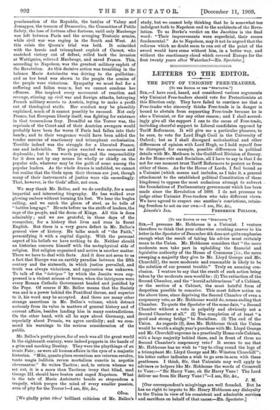[To THE EDITOR OP TEE "SPECTATOR."]
presume Mr. Hobhouse is a Unionist. I venture therefore to think that your otherwise crushing answer to his letter in the Spectator of December 4th does not quite emphasise enough what the result of taking his advice must certainly mean to the Union. Mr. Hobhouse considers that "the more moderate men take part in upholding the financial and legislative authority of the House of Commons [i.e., the more sweeping a majority they give to Mr. Lloyd George and ,Mr. Churchill], the more moderate and reasonable is likely to be the solution of our present trouble." Truly an amazing con. elusion. I venture to say that the result of such action being taken by the moderate men would be: (1) The extinction of the Second Chamber, and the "horrid arbitrariness " of a Cabinet, or the section of a Cabinet, ' the most hateful form of despotism possible to conceive. This must follow action on the above lines, since depriving the Second Chamber of even a suspensory veto, as Mr. Hobhouse would do, means ending that Chamber. To quote the Spectator of the same date, "a Second Chamber without a veto is palpably and obviously not a Second Chamber at alL" (2) The completion of at least "a good and strong bridge" to Socialism. (3) The end of the Union. As regards (3), does Mr. Hobhouse think the Union would be worth a single year's purchase with Mr. Lloyd George and Mr. Churchill supreme in a practically Home-rule Cabinet, with a large majority behind them, and in front of them no Second Chamber's suspensory -veto ? It seems to mg that Mr. Hobhouse has no wish to "try to cling round the legs of a triumphant Mr. Lloyd George and Mr. Winston Churchill"; his letter rather indicates a wish to go arm-in-arm with these gentlemen. I think, Sir, that Unionists may well apply to advisers or helpers like Mr. Hobhouse the words of Cromwell to Vane :—".Sir Harry Vane, oh Sir Harry Vane ! The Lord deliver me from Sir Harry Vane! "—I am, Sir, &c., j. M. [Our correspondent's misgivings are well founded. But he has no right to imp-ate to Mr. Henry Hobhouse any disloyalty to the Union in view of his consistent and admirable services and sacrifices on behalf of that *cause.—En. Spectator.]
























































 Previous page
Previous page